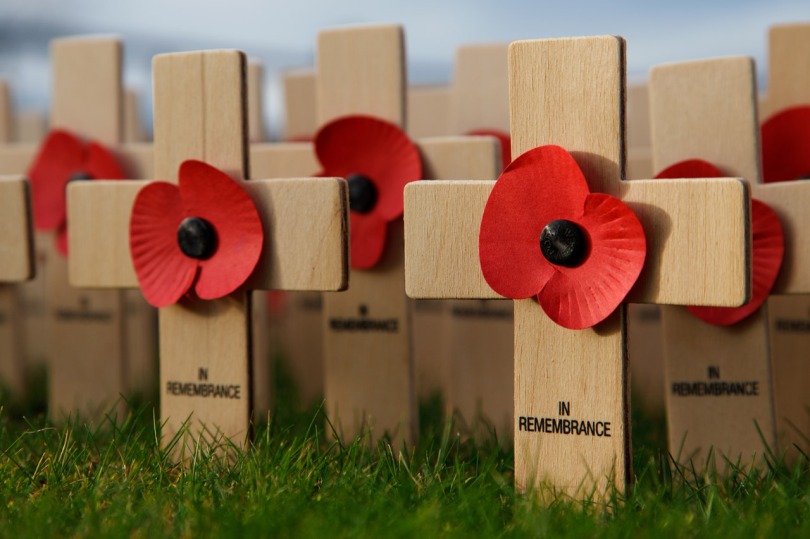The following remarks were delivered to the Florence County Republican Party at its 12 November 2018 monthly program, which was dedicated to honoring veterans.
Yesterday Americans, Europeans, and the world commemorated the 100th anniversary of the end of the Great War, what we call the First World War. The Armistice that silenced the guns of one of the most brutal conflicts in human history was signed in the wee hours of 11 November 1918, but did not take effect until 11 AM—the eleventh hour of the eleventh day of the eleventh month. That bit of numerical symmetry, while memorable, cost an additional 2738 lives, with 10,944 casualties—a pointless denouement to a destructive war.
Peace would ultimately come to Europe—after three prolongations of the Armistice—in 1920 with the ratification of the Treaty of Versailles (the United States, refusing to join the League of Nations, negotiated a separate treaty with Germany, the Treaty of Berlin, in 1921). That treaty, which the Germans called the Diktat because of its severity, and because it pinned the war solely on the German Empire, was a reflection of the Armistice signed three years earlier.
In preparing tonight’s remarks, I came across an article that describes the first meeting between Marshall Foch, the commander-in-chief of the Allied forces, and Matthias Erzberger, a middle-aged German politician who had come to sue for peace. The Frenchman looked stonily at the German peace delegation, and said, “Tell these gentlemen I have no proposals to make.” Rather, Marshal Foch had a number of demands to issue, thirty-four in total, including Germany’s agreement to pay heavy reparations.
In hindsight, we know the folly of trying to squeeze blood and treasure from the turnip that was a starving, reduced Germany—and the radicalism it, in part, inspired. But we have to understand, as best we can, the bitterness and weariness the Great War wrought. Millions of men in Europe had lost their lives, or were maimed for life, fighting in the war. The republican governments of France and Britain were not willing to accept peace without something to show for it; their people (and voters) would not have accepted it. Indeed, Marshall Foch told his staff he intended “to pursue the Feldgrauen [field grays, or German soldiers] with a sword at their backs” until the moment the Armistice went into effect. One cannot help but wonder that the fighting in this final hours was motivated, in part, by a mutual bloodlust, and an opportunity to settle scores one last time before the clock struck eleven.
From the grime and death of the Great War, however, grew new hope—a hope for peace, yes, but also a hope that humanity could avoid such a devastating conflict again. That hope—and the enduring hope for a world built on peace and understanding—is poignantly symbolized in the flowering of the churned up “No Man’s Land,” the pock-marked area between Allied and German trenches. Immortalized in Canadian Lieutenant-Colonel John McCrae’s “In Flanders Fields,” poppies were first flowers to bloom in that graveyard of Western civilization. To this day, the crimson of the poppies serves as a reminder of the men who made the ultimate sacrifice for their countries, and that even in death, life endures.
I will close this somewhat grim Historical Moment with a brief reading of that poem; it can commemorate the men there far better than I:
In Flanders fields the poppies blow
Between the crosses, row on row,
That mark our place; and in the sky
The larks, still bravely singing, fly
Scarce heard amid the guns below.We are the Dead. Short days ago
We lived, felt dawn, saw sunset glow,
Loved and were loved, and now we lie
In Flanders fields.Take up our quarrel with the foe:
To you from failing hands we throw
The torch; be yours to hold it high.
If ye break faith with us who die
We shall not sleep, though poppies grow
In Flanders fields.



Excellent. I learned something!
LikeLiked by 1 person
We read the poem and discussed this in class Monday. I wish I had had your comments to add on to the discussion.
LikeLiked by 1 person
It’s never too late to inject some TPP into your classroom, Lindy.
LikeLike
This is awesome Tyler.
LikeLiked by 1 person
[…] web of secret alliances and global brinksmanship. But for its faults—and the mostly pointless slaughter of millions of young men on the battlefields of Europe—the West was (and is) the […]
LikeLike
[…] “Veterans’ Day 2018, Commemoration of the Great War, and Poppies” – like President George W. Bush, I am not one of the great orators of our time, but […]
LikeLike
[…] Armed Services Day, which honors those men and women currently serving in the armed services; and Veterans’ Day, which honors all American servicemen and women, living, dead, retired, active, […]
LikeLike
[…] of our own civilization and its values is the metaphysical problem that has that bell ringing. Western civilization is losing its mojo, its […]
LikeLike
[…] slim. Other than the post below, I reblogged my annual Thanksgiving message, and posted a Veterans’ Day talk I delivered to the local Republican Party. I’d really let the blog slide as I dove into […]
LikeLike
[…] The piece below is adapted from a talk I gave to the Florence County, South Carolina GOP last year at its November 2018 monthly meeting. I still think it’s one of the best Historical Moment talks I ever gave, but that’s mostly due to John McCrae’s powerful poem “In Flanders Fields“; the poem is reproduced in full below. […]
LikeLike
[…] Armed Services Day, which honors those men and women currently serving in the armed services; and Veterans’ Day, which honors all American servicemen and women, living, dead, retired, active, […]
LikeLike